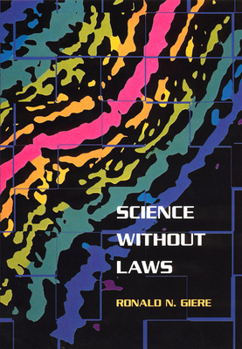Science Without Laws
Debate over the nature of science has recently moved from the halls of academia into the public sphere, where it has taken shape as the "science wars." At issue is the question of whether scientific knowledge is objective and universal or socially mediated, whether scientific truths are independent of human values and beliefs. Ronald Giere is a philosopher of science who has been at the forefront of this debate from its inception, and Science without...
Format:Hardcover
Language:English
ISBN:0226292088
ISBN13:9780226292083
Release Date:June 1999
Publisher:University of Chicago Press
Length:296 Pages
Weight:0.65 lbs.
Dimensions:0.9" x 6.0" x 9.0"
Customer Reviews
2 ratings
Challenging but worth the effort.
Published by Thriftbooks.com User , 20 years ago
If like myself, you don't have a formal background in philosophy, you'll probably find this book challenging in places. It's not an introduction to philosophy of science. The chapters are pretty autonomous. And some of them address specific works of specific philosophers who will probably not be familiar to general readers.But I still think it's worth the effort. I learned a tremendous amount from this book. And I intend to seek out other books by Giere. My own background is in engineering. But I've worked with scientists and I've long had an interest in the history of science. But most of what I've read in the past about the philosophy of science seemed artificial and unrelated to what scientists actually do. I found Giere's philosophy refreshingly different. By viewing theories as families of models which fit observed reality more or less well, rather than as mere collections of statements about reality that can be true or false, Giere creates a philosophy of science that reflects what scientists actually do. Highly recommended to motivated readers.
science as models representing reality
Published by Thriftbooks.com User , 22 years ago
The debate familiar to many in English departments between the old-school positivist/("reductionist") view of science and the post-Kuhnian social constructionist/("relativist") view is revealed by Giere to be a crude first approximation of the real issues. This is an excellent series of eleven essays, that moves from the most general considerations to more advanced topics such as naturalism, realism, and model testing, and then to arcane debates with like-minded philosophers of science. Giere only finally lost me with his debate with Van Fraasen -- Van Fraasen's position is "constructive empiricism," while Giere prefers "constructive realism." Giere persuaded me, vis a vis Van Fraasen and empiricism, but left me with the impression that this distinctinction is not of great importance. The gist of Giere's naturalist theory is that there is no unitary, epistemologically privileged science, but rather a process of developing and testing models (plural) that are found to fit reality either well or not so well. This is quite reasonable, and Giere manages to transcend and make irrelevant many of the positivist/constructionist arguments. I recently read James Robert Brown's "Who Rules In Science?", another excellent book on the philosophy of science. Brown is more traditional, closer to the Hempel/Salmon school. Brown does not cite Giere, and neither does Giere cite Brown, a great piece of empirical evidence for the problem of fragmentation in academia -- even scholars working on the same problems can be part of different tendencies and be unaware of, or ignore, one another. I would like to see a debate between these two -- I'm convinced that it would be much more fruitful than most of the "Science Wars," given that much of the conflict there is generated by ideology, not epistemology, and by people in English departments who lack an understanding of either science or philosophy.




